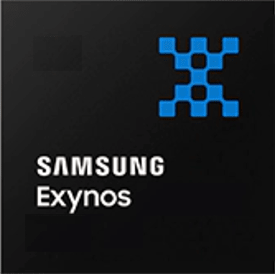Samsung Exynos 1480 Benchmark, Test and specs
Last updated:
The Samsung Exynos 1480 has 8 CPU cores and can process 8 threads at the same time. The processor was presented in Q2/2024 and is based on the 8. Generation of the Samsung Exynos series. In the Geekbench 5 benchmark, the Samsung Exynos 1480 achieved a result of 893 points (single-core) or 3,358 points (multi-core).

| Name: | Samsung Exynos 1480 |
|---|---|
| Family: | Samsung Exynos (47) |
| CPU group: | Samsung Exynos 14xx (1) |
| Architecture: | Cortex-A78/-A55 |
| Segment: | Mobile |
| Generation: | 8 |
| Predecessor: | -- |
| Successor: | -- |
CPU Cores and Base Frequency
The Samsung Exynos 1480 has 8 cores. The clock frequency of the Samsung Exynos 1480 is 2.75 GHz. An initial performance assessment can be made using the number of CPU cores.
| CPU Cores / Threads: | 8 / 8 |
|---|---|
| Core architecture: | hybrid (big.LITTLE) |
| A-Core: | 4x Cortex-A78 |
| B-Core: | 4x Cortex-A55 |
| Hyperthreading / SMT: | No |
|---|---|
| Overclocking: | No |
| A-Core Frequency: | 2.75 GHz |
| B-Core Frequency: | 2.00 GHz |
Artificial Intelligence and Machine Learning
Processors with the support of artificial intelligence (AI) and machine learning (ML) can process many calculations, especially audio, image and video processing, much faster than classic processors. Algorithms for ML improve their performance the more data they have collected via software. ML tasks can be processed up to 10,000 times faster than with a classic processor.
| AI hardware: | Samsung AI engine |
|---|---|
| AI specifications: | AI Engine with 6K MAC NPU |
Internal Graphics
The Samsung Exynos 1480 has an integrated graphics that the system can use to efficiently play back videos. The Samsung Exynos 1480 has the Samsung Xclipse 530 installed, which has -- streaming multiprocessors (-- shaders).
| GPU name: | Samsung Xclipse 530 |
|---|---|
| GPU frequency: | 1.30 GHz |
| GPU (Turbo): | 1.30 GHz |
| Compute units: | -- |
| Shader: | -- |
| Hardware Raytracing: | No |
| Release date: | Q2/2024 |
| Max. displays: | 0 |
|---|---|
| Generation: | -- |
| Direct X: | 12 |
| Technology: | 4 nm |
| Max. GPU Memory: | -- |
| Frame Generation: | No |
Hardware codec support
Processors with integrated graphics can process video codecs faster. Support for modern codecs can significantly increase system efficiency during video playback.
| h265 / HEVC (8 bit): | Decode / Encode |
|---|---|
| h265 / HEVC (10 bit): | Decode / Encode |
| h264: | Decode / Encode |
| VP8: | No |
| VP9: | Decode / Encode |
| AV1: | Decode |
|---|---|
| AVC: | No |
| VC-1: | No |
| JPEG: | No |
Memory & PCIeThe Samsung Exynos 1480 supports a maximum of memory. Depending on the mainboard, the processor can use a maximum of 0 memory channels. This results in a maximum bandwidth of the main memory of --. |
|
| Memory type: | Memory bandwidth: |
|---|---|
| LPDDR4X LPDDR5 | -- -- |
| Max. Memory: | |
| Memory channels: | 0 |
| ECC: | No |
| PCIe: | |
| PCIe Bandwidth: | -- |
Thermal ManagementThe Samsung Exynos 1480 has a TDP of . Based on the TDP, the system manufacturer can and must adapt the cooling solution to the processor. |
|
|---|---|
| TDP (PL1 / PBP): | |
| TDP (PL2): | -- |
| TDP up: | -- |
| TDP down: | -- |
| Tjunction max.: | -- |
Technical details
Modern production reduces the waste heat of a processor and increases its efficiency. The Samsung Exynos 1480 is made in 4 nm and has 0.00 MB cache.
| Technology: | 4 nm |
|---|---|
| Chip design: | |
| Socket: | -- |
| L2-Cache: | -- |
| L3-Cache: | -- |
| AES-NI: | No |
| Operating systems: | Android, Windows ARM |
| Virtualization: | None |
|---|---|
| Instruction set (ISA): | Armv8-A (64 bit) |
| ISA extensions: | -- |
| Release date: | Q2/2024 |
| Release price: | -- |
| Part Number: | -- |
| Documents: | Technical data sheet |
Rate this processor
Benchmark results

The benchmark results for the Samsung Exynos 1480 have been carefully checked by us. We only publish benchmark results that have been created by us or that have been submitted by a visitor and then checked by a team member. All results are based on and fullfill our benchmark guidelines.
Geekbench 5, 64bit (Single-Core)
Geekbench 5 is a cross plattform benchmark that heavily uses the systems memory. A fast memory will push the result a lot. The single-core test only uses one CPU core, the amount of cores or hyperthreading ability doesn't count.
|
|
Intel Core i7-4910MQ
4C 8T @ 3.90 GHz |
||
|
|
AMD Ryzen 5 1600
6C 12T @ 3.60 GHz |
||
|
|
AMD Ryzen 5 PRO 1600
6C 12T @ 3.60 GHz |
||
|
|
Samsung Exynos 1480
8C 8T @ 2.75 GHz |
||
|
|
Intel Core i5-7440EQ
4C 4T @ 3.60 GHz |
||
|
|
Intel Xeon Silver 4210
10C 20T @ 3.20 GHz |
||
|
|
Intel Xeon E5-2680 v4
14C 28T @ 3.30 GHz |
||
Geekbench 5, 64bit (Multi-Core)
Geekbench 5 is a cross plattform benchmark that heavily uses the systems memory. A fast memory will push the result a lot. The multi-core test involves all CPU cores and taks a big advantage of hyperthreading.
|
|
Intel Core i5-5675R
4C 4T @ 3.30 GHz |
||
|
|
Intel Core i7-4770
4C 8T @ 3.60 GHz |
||
|
|
Intel Core i7-5750HQ
4C 8T @ 3.10 GHz |
||
|
|
Samsung Exynos 1480
8C 8T @ 2.75 GHz |
||
|
|
Intel Pentium Gold G7400
2C 4T @ 3.70 GHz |
||
|
|
Intel Xeon E3-1240L v5
4C 8T @ 2.40 GHz |
||
|
|
Samsung Exynos 2100
8C 8T @ 2.90 GHz |
||
Geekbench 6 (Single-Core)
Geekbench 6 is a benchmark for modern computers, notebooks and smartphones. What is new is an optimized utilization of newer CPU architectures, e.g. based on the big.LITTLE concept and combining CPU cores of different sizes. The single-core benchmark only evaluates the performance of the fastest CPU core, the number of CPU cores in a processor is irrelevant here.
|
|
Intel Core i7-4770K
4C 8T @ 3.90 GHz |
||
|
|
Intel Xeon E5-2637 v4
4C 8T @ 3.70 GHz |
||
|
|
Intel Xeon E3-1220 v3
4C 4T @ 3.50 GHz |
||
|
|
Samsung Exynos 1480
8C 8T @ 2.75 GHz |
||
|
|
Intel Core i7-7820EQ
4C 8T @ 3.70 GHz |
||
|
|
Intel Atom x7425E
4C 4T @ 3.40 GHz |
||
|
|
Intel Processor N95
4C 4T @ 3.40 GHz |
||
Geekbench 6 (Multi-Core)
Geekbench 6 is a benchmark for modern computers, notebooks and smartphones. What is new is an optimized utilization of newer CPU architectures, e.g. based on the big.LITTLE concept and combining CPU cores of different sizes. The multi-core benchmark evaluates the performance of all of the processor's CPU cores. Virtual thread improvements such as AMD SMT or Intel's Hyper-Threading have a positive impact on the benchmark result.
|
|
Intel Core i7-3960X
6C 12T @ 3.90 GHz |
||
|
|
Intel Xeon D-2123IT
4C 8T @ 2.40 GHz |
||
|
|
Intel Core i3-9100T
4C 4T @ 3.40 GHz |
||
|
|
Samsung Exynos 1480
8C 8T @ 2.75 GHz |
||
|
|
Intel Xeon E3-1226 v3
4C 4T @ 3.30 GHz |
||
|
|
Intel Core i7-4700HQ
4C 8T @ 3.00 GHz |
||
|
|
Qualcomm Snapdragon 888+
8C 8T @ 3.00 GHz |
||
AnTuTu 10 Benchmark
The AnTuTu 10 benchmark is one of the best-known benchmarks for mobile processors, which is now available in version 10. There is a version for Android-based smartphones and tablets, as well as a version for Apple mobile devices, i.e. iPhones and iPads.
The Antutu 10 benchmark has 3 phases. In the first phase, the device's RAM is tested, in phase 2 the graphics are tested and in the final phase the entire device is pushed to its performance limits by rendering 3D graphics.
Antutu 10 is therefore ideal for comparing the performance of different devices.
The Antutu 10 benchmark has 3 phases. In the first phase, the device's RAM is tested, in phase 2 the graphics are tested and in the final phase the entire device is pushed to its performance limits by rendering 3D graphics.
Antutu 10 is therefore ideal for comparing the performance of different devices.
|
|
Samsung Exynos 2200
8C 8T @ 2.80 GHz |
||
|
|
Google Tensor G3
8C 8T @ 2.91 GHz |
||
|
|
Qualcomm Snapdragon 7 Gen 3
8C 8T @ 2.63 GHz |
||
|
|
Samsung Exynos 1480
8C 8T @ 2.75 GHz |
||
|
|
Qualcomm QCM6490
8C 8T @ 2.71 GHz |
||
|
|
Samsung Exynos 1380
8C 8T @ 2.40 GHz |
||
|
|
Qualcomm Snapdragon 778G
8C 8T @ 2.40 GHz |
||
Benchmarks

Geekbench 5 (SC)
2,492 entries
2,492 entries

Geekbench 5 (MC)
2,464 entries
2,464 entries

Geekbench 6 (SC)
1,762 entries
1,762 entries

Geekbench 6 (MC)
1,710 entries
1,710 entries

AnTuTu 10 Benchmark
17 entries
17 entries
Popular comparisons
back to index

















